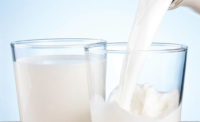Protein has definitely become a popular nutrient lately. Nutrition experts promote protein for its many health benefits, particularly satiety and appetite control to help people keep their resolutions to lose weight.
Nutrition research has pointed toward a variety of health benefits for protein: maintaining muscle mass when losing weight or growing older, promoting satiety, exercise recovery and helping maintain healthy function in the body. The high quality of dairy protein makes dairy products a great source of protein’s benefits. Let’s look at a few studies that highlight the benefits of dairy protein.
Dairy protein helps reduce abdominal fat
Obesity is a risk factor for a variety of health problems, including heart disease and Type II diabetes. Abdominal fat, or belly fat, presents even higher risks for heart disease, diabetes and atherosclerosis (accumulation of plaque in blood vessels). Therefore, while reducing weight and body fat are important in preventing disease, reducing abdominal fat is even more important.
A recent study of obese adults compared consumption of a breakfast drink that was either high in dairy protein or high in soy protein. There was no intention to reduce calories overall and calorie intake between the two groups were similar. While people in both groups lost weight over 20 weeks, the study participants who consumed the dairy protein drink lost significantly more weight and also lost significantly more abdominal fat, reducing their abdominal fat by approximately 20%. The authors indicated that, in addition to the effect of the dairy protein, calcium may also be responsible for part of this fat loss.
Dairy protein may help people lose weight, particularly belly fat. This could help prevent many of the negative health consequences associated with abdominal fat.
Source: Takahira M, K Noda, M Fukushima, B Zhang, R Mitsutake, Y Uehara, M Ogawa, T Kakuma, K Saku. “Randomized, Double-Blind, Controlled, Comparative Trial of Formula Food Containing Soy protein vs. milk protein in visceral fat obesity.” Circ J 2011, 75: 2235-2243.
Protein, in conjunction with exercise, builds muscle mass
One recent article reviewed multiple studies and reconfirmed the role of protein in building muscle when consumed in conjunction with resistance-type exercise. The studies examined the effects of protein plus exercise on healthy adults of a variety of ages. Many of the studies used milk protein, either whole or separately as whey or casein, as the protein source. The people included in the study were already consuming adequate levels of protein, so the protein that was added (either milk protein or other protein sources) brought the levels of protein above the minimum protein requirements for adults.
When the results of the various studies were pooled together, people who paired protein supplementation with exercise built more muscle mass and were able to leg press higher weight, when compared to people who exercised without adding protein. Younger adults who were trained athletes showed an even greater level of muscle mass increase than younger, untrained adults when adding protein.
The results of this article indicate that younger adults looking to build muscle mass may need to add more protein to their diet, while older adults can pair protein and exercise to support healthy aging.
Source: Cermak NM, PT Res, LCPDM de Groot, WHM Saris and LJC van Loon. “Protein supplementation augments the adaptive response of skeletal muscle to resistance-type exercise training: a meta- analysis.” Am J Clin Nutr 2012, 96:1454-64.
Dairy protein helps prevent fractures in older adults
In addition to helping older adults with building muscle, dairy protein can be useful for strengthening bone and preventing falls and breaks. Calcium and vitamin D are often thought of as important nutrients in preventing osteoporosis. But one article points out the importance of a number of nutrients in dairy, including protein, in supporting muscle and bone strength and preventing fragility fractures in older people.
Protein is an essential part of the structure of bone. In addition, it helps increase the levels of a particular growth factor in the human body, IGF-I, that is associated with lower levels of fractures. IGF-I stimulated by protein intake affects vitamin D, calcium and other minerals that build bone. Protein also affects the levels of calcium in the body, most notably increasing calcium retention in women with a low calcium intake.
Muscle strength can also help prevent fractures in older people by preventing falls. Older adults with high protein intakes lose less muscle, particularly in their arms and legs, helping to prevent sarcopenia (a loss of muscle mass as part of the aging process).
Source: Bonjour J, M Kraenzlin, R Levasseur, M Warren, S Whiting. “Dairy in Adulthood: From Foods to Nutrient Interactions on Bone and Skeletal Muscle Health.” J Am Coll Nutr 2013, 32: 251-263.
Milk protein improves overall metabolism to help prevent chronic diseases
“Metabolism” is a term for the biochemical processes in the body’s normal functioning. Metabolic syndrome is a group of issues, including high blood sugar, high blood pressure, and low levels of “good” cholesterol (HDL), that indicate that metabolism isn’t proceeding normally. Metabolic syndrome can be the first step toward many chronic diseases such as heart disease, diabetes and stroke.
A recently published paper summarizes evidence supporting the benefits of dairy proteins on insulin sensitivity, blood fat and cholesterol levels, blood pressure, weight control and muscle mass and function. All of these effects can help people maintain a healthy weight as well as healthy blood pressure and healthy blood glucose levels, to help prevent heart disease, diabetes and other diseases. In keeping with the findings of other studies above, milk proteins help build muscle, particularly when combined with exercise, while also preventing abdominal fat.
Both whey and casein affect the function of insulin, which is a hormone that regulates blood sugar. Whey and casein can improve insulin function, which helps cells absorb glucose, lowering sugar in the blood. Impaired sensitivity to insulin results in high blood sugar, and is the key to diabetes.
The review also identified a number of research studies that demonstrate a relationship between milk protein and healthier blood pressure. In a variety of people, of both normal weight and obese weights and those with normal blood pressure and high blood pressure, milk products and milk proteins have helped decrease blood pressure.
Proteins in general help promote a feeling of satiety, which can often help lower food intake and help maintain a healthy body weight. One of the studies highlighted indicated that milk with a combination of whey and casein had a larger effect on satiety than either of these proteins separately.
Increased satiety, along with the muscle-building effects of dairy protein, could explain findings that people consuming diets high in dairy protein may have lower body weights and less fat. For people trying to lose weight through lower-calorie diets, dairy protein seems to help reduce body fat while preserving muscle mass.
Overall, nutrition research is identifying the important benefits of protein. With significant levels of high-quality protein, dairy foods can be excellent sources of protein and its health benefits. Milk and dairy products offer a simple way to add protein to breakfast, lunch, dinner or snacks.
Source: McGregor R and SD Poppitt. “Milk protein for improved metabolic health: a review of the evidence.” Nutr Metab 2013; 10:46.



